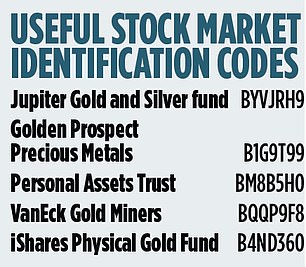Forget Willy Wonka: could investing in GOLD be the golden ticket?
Golden ticket: the new Wonka film starring Timothee Chalamet
The new Wonka movie starring Timothee Chalamet isn't the only golden ticket in town. This week, the gold price reached a record high, reaching over $2,100 per ounce. This left investors wondering whether they should add some shine to their portfolios.
Whether you hold it as a precious metal, invest through a fund or engage in gold mining, the precious metal has a unique appeal despite some obvious limitations.
“Last time I checked, you can't pay for your groceries with gold,” says Rob Burgeman of asset manager RBC Brewin Dolphin. 'And unlike other investments such as shares, it does not provide any form of income. It can also be quite volatile for world events.”
Nevertheless, Burgeman believes that gold generally deserves a place in most people's portfolios. The question is: how much should you hold on to and how? And with prices at record highs, is this the worst time to buy?
Unique character traits
Anyone who lived through the German hyperinflation of the 1930s understood what gold can do. Because the currency lost value every day, those who had bought gold with their marks could safely store their wealth, rather than end up with wheelbarrows full of worthless banknotes.
The metal serves a similar, though less dramatic, function today. Max Belmont, portfolio manager at First Eagle Investments, which manages a gold fund, says its ability to preserve real purchasing power during extreme events means investors view it as a safe haven.
The more pessimistic you are about the state of the world, the more likely you are to want to hold gold in the hope that the price will rise. But many people use it as a diversification tool to protect their portfolios from extreme moves, regardless of how they feel about the economy.
However, gold itself can be a volatile investment. Global uncertainty tends to push up prices in the long term, but in the short term there can be wide swings.
Higher interest rates also tend to lower the price. That's because gold does not generate income. When interest rates are low, investors do not feel this as keenly. But when investors can gain a few percentage points on their money by simply putting it in a savings account, the lack of income from gold becomes a bigger turnoff.
Adrian Ash, director of BullionVault, which holds physical gold for investors, says that while gold doesn't always provide an effective hedge in the short term, it does over longer periods. 'It's no better than a coin toss as to whether the gold price will move in the opposite direction of the UK stock market. But over a longer time horizon, gold tends to do well while other assets do poorly.”
Why gold runs like clockwork
The record high price of gold this week is largely due to geopolitical tensions, especially in Ukraine and the Middle East. In the week after the Hamas attacks on Israel, the gold price rose by six percent.
The expectation that interest rates have peaked is also driving up the price of gold.

The weakening US dollar is also impacting the price, said Andrew Prosser, head of investments at ETF platform Investengine. The price of gold is measured in US dollars, so if the dollar is weaker, it increases the purchasing power of non-US gold buyers. Moreover, central banks around the world are still busy grabbing the precious metal. Last year, more than 1,000 tons of gold were bought by central banks and government bonds. A further 800 tonnes were purchased from January to September this year.
Robert Minter, director of ETF Investment Strategy, at investment group Abrdn, says this buying spree is unlikely to stop. “It's part of a move to diversify away from the US dollar,” he says. Minter adds that the majority of purchases are concentrated in the so-called Brics countries – Brazil, Russia, India, China and South Africa.
Ash at BullionVault believes the price could be further strengthened by a traditional buying spree among investment managers in January. He says that gold prices have risen in seven of the past 10 Januarys due to this factor.
“Portfolio managers are looking ahead to reposition their asset allocation,” he says. “They tend to focus on the risks and threats of the year ahead, and many of them are turning to gold as a kind of investment insurance.”
But if interest rates stay higher than expected and geopolitical tensions ease, gold could lose its luster. First Eagle's Max Belmont says this doesn't stop the company from serving its purpose as a “source of resilience in a wide variety of adverse conditions.”
'We do not predict the price of gold. We use it as a strategic position against the weaknesses that could impact the market,” he says.
Some links in this article may be affiliate links. If you click on it, we may earn a small commission. That helps us fund This Is Money and keep it free to use. We do not write articles to promote products. We do not allow a commercial relationship to compromise our editorial independence.
